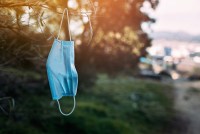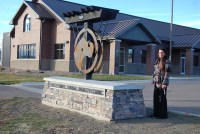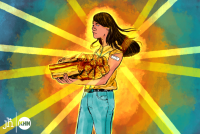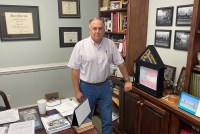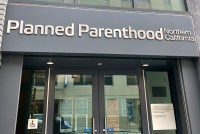Latest KFF Health News Stories
Para las personas con sistemas inmunes frágiles no hay retorno a la “normalidad”
Personas con salud frágil y de alto riesgo denuncian que se les ignora. Mientras, el resto de la sociedad abandona las medidas de protección contra la pandemia, como el uso de la máscara y la distancia física.
Covid Still Threatens Millions of Americans. Why Are We So Eager to Move On?
Those who are living with disabilities, chronic illnesses or are immunocompromised because of medications or cancer treatment feel that their needs are not being considered as states open back up and lift mask mandates.
Inmates Who Died Asked for Release Before Falling Ill With Covid
Covid is running rampant through the Alderson women’s prison in West Virginia, in one of the deadliest outbreaks this year at a federal correctional facility. This comes as Bureau of Prisons officials take heat for how the agency has handled the pandemic.
State Constitutions Vex Conservatives’ Strategies for a Post-Roe World
Conservative lawmakers may find their anti-abortion agendas complicated by state constitutions that explicitly grant citizens the right to privacy, regardless of what the U.S. Supreme Court does.
What Does It Say About Your Neighborhood If the Supermarket Isn’t So Super?
A mother-and-daughter team went comparison-shopping to see what grocery store shelves revealed about inequity in America.
Biden Administration’s Rapid-Test Rollout Doesn’t Easily Reach Those Who Need It Most
Two rapid-testing initiatives the Biden administration released in the past week are inaccessible to some residents of multifamily housing, people who don’t speak English well, or those without internet access.
El plan de Biden para entregar pruebas gratis para covid no llega fácilmente a los más vulnerables
Desde el límite establecido en los pedidos de prueba hasta los idiomas disponibles en los sitios web, los programas pueden dejar fuera a muchas personas que no hablan inglés o no tienen acceso a Internet, así como a las que viven en hogares multigeneracionales.
‘Heart’ of Little Shell: Newest Federally Recognized Tribe to Open First Clinic
The Little Shell Tribe of Chippewa Indians of Montana plans to open the nation’s newest Indian Health Service clinic in Great Falls on Jan. 31 — marking the first time the tribe will have its culture reflected in health care offerings.
‘American Diagnosis’ Episode 1: On the Navajo Nation, Root Causes Complicated the Covid Fight
Explore what made the Navajo people ― also known as the Diné ― so vulnerable to the first surges of the covid-19 pandemic. The first episode of “Rezilience,” Season 4 of the “American Diagnosis” podcast, begins in the forests outside the Grand Canyon.
Deep Roots Help This Chicago Pharmacist Avoid Creating Another Drugstore Desert
Predominantly Black and Hispanic urban areas are more likely than white neighborhoods to see local pharmacies close and are more likely to be pharmacy deserts. In Chicago, one pharmacist is bucking the trend, operating the drugstore his father opened in the 1960s in a Black neighborhood.
Rural Communities Left Hurting Without a Hospital, Ambulance or Doctors Nearby
Rural areas such as Echols County, Georgia, have high levels of uninsured people and profound physician shortages that compound the lack of health care options, especially in the 12 states that have not expanded Medicaid.
Con más muertes por sobredosis, defensores claman por una naloxona de venta libre
La administración Biden ha destinado $30 millones a programas de reducción de daños por adicciones. Pero defensores dicen que la principal barrera es que la naloxona sigue siendo de venta bajo receta.
With Overdose Deaths Surging, Advocates on the Ground Push for Over-the-Counter Naloxone
Harm-reduction groups say that requiring a doctor to sign off on their orders of the overdose reversal drug is one of the biggest barriers they face in obtaining the lifesaving medication.
Journalists Discuss Omicron, Public Health, Culturally Competent Care
KHN and California Healthline staff made the rounds on national and local media this week to discuss their stories. Here’s a collection of their appearances.
Data Science Proved What Pittsburgh’s Black Leaders Knew: Racial Disparities Compound Covid Risk
Inside the Black Equity Coalition’s novel effort to share community health intel and scrape government data to understand — and document — the life-threatening differences between white and Black Pittsburgh.
California Plans for a Post-Roe World as Abortion Access Shrinks Elsewhere
While other states dramatically restrict abortion and the conservative-leaning U.S. Supreme Court weighs Roe v. Wade, California is preparing to absorb the country’s abortion patients.
‘Covid Hit Us Over the Head With a Two-by-Four’: Addressing Ageism With Urgency
In light of the pandemic’s shocking death toll among seniors, organizations are trying new strategies to help older Americans get better care.
Las experiencias de Whitney revelan la discriminación por edad en los entornos de atención médica, un problema de larga data que está recibiendo nueva atención durante la pandemia de covid, que ha matado a más de medio millón de estadounidenses de 65 años y más.
‘They Treat Me Like I’m Old and Stupid’: Seniors Decry Health Providers’ Age Bias
Ageism in health care settings, which can result in inappropriate or dangerous treatment, is getting new attention during the covid pandemic, which has killed more than half a million Americans age 65 and older.
Covid Is Killing Rural Americans at Twice the Rate of Urbanites
The pandemic is devastating rural America, where lower vaccination rates are compounding the already limited medical care.



